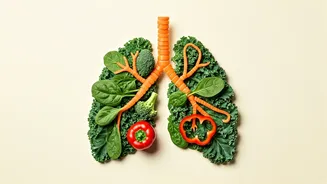Food and Lungs
The food we consume significantly impacts various aspects of our health, and our lungs are no exception. The foods we eat can either support or hinder
optimal respiratory function, and it is a topic often neglected. Certain food items can trigger inflammation, mucus production, and oxidative stress in the lungs. It is essential to understand how these food items impact our respiratory system to make informed dietary choices that promote lung health. These choices can significantly improve the ability to breathe easily, thus improving overall quality of life. This requires us to be aware of what we are putting into our bodies and how that affects our well being. Prioritizing foods that support lung health is a proactive strategy for maintaining a clear, efficient respiratory system and staying healthy.
Processed Meats
Processed meats, such as bacon, sausage, and deli meats, often contain high levels of nitrites and nitrates, chemicals added as preservatives. The ingestion of these can lead to the formation of nitrosamines, which are carcinogenic compounds associated with increased inflammation in the lungs. Regular consumption of processed meats has also been linked to a higher risk of chronic obstructive pulmonary disease (COPD) and other respiratory illnesses. It is prudent to minimize the intake of these processed foods to protect the lungs. When choosing meat products, select fresh or minimally processed options. Always carefully read food labels, and look for products free of added nitrates and nitrites. Opting for fresh, unprocessed meats contributes to the reduction of harmful chemicals and supports lung health, encouraging a healthier respiratory system and improving overall health.
Sugary Beverages
Sugary beverages, including sodas, sweetened teas, and fruit juices, have been linked to an increased risk of respiratory problems. High sugar intake can cause weight gain and obesity, which can place added strain on the lungs. Studies show that excessive sugar consumption can also contribute to increased inflammation throughout the body, including the lungs. Furthermore, the high fructose content in some sugary drinks may impair lung function. The consistent intake of sugar can also lead to weakened immune responses, making individuals more susceptible to respiratory infections. Cutting back on sugary drinks and opting for water, unsweetened tea, or fruit-infused water can help improve overall health and support lung function, encouraging better respiratory health.
Salty Foods
Excessive salt intake can lead to water retention, which may increase blood pressure and can put stress on the entire cardiovascular system, impacting lung health. High sodium intake can worsen symptoms of respiratory conditions such as asthma and COPD. Foods that are high in salt, such as processed snacks, fast food, and canned goods, should be limited. Choose fresh, whole foods and use herbs and spices to flavor meals instead of relying on excessive salt. When possible, read food labels, and look for low-sodium alternatives. Reducing salt consumption supports overall health and helps to protect against the detrimental effects of excess sodium on respiratory function, and contributes to better respiratory health.
Dairy Products
Dairy products can sometimes worsen respiratory symptoms in certain individuals, particularly those with sensitivities or allergies. Some people experience increased mucus production after consuming dairy, which can make it more difficult to breathe and contribute to congestion. This effect can be more pronounced in individuals with asthma or allergies. If you suspect that dairy is impacting your respiratory health, you might consider eliminating it from your diet or reducing your intake to see if your symptoms improve. Many dairy-free alternatives are available, such as plant-based milks, cheeses, and yogurts, to ensure you can still enjoy delicious and nutritious meals without compromising your respiratory health. Paying close attention to how your body reacts to dairy and making necessary adjustments will help improve the quality of your breathing.
Refined Grains
Refined grains, such as white bread, pasta, and pastries, are often processed to remove the bran and germ, thus stripping them of many vital nutrients. These types of grains can lead to inflammation and spikes in blood sugar, both of which can negatively impact lung health. High blood sugar levels can impair the immune system, making individuals more vulnerable to respiratory infections. Consuming refined grains offers little nutritional value, compared to their whole-grain counterparts. Swapping refined grains for whole grains, such as whole-wheat bread, brown rice, and oats, can provide essential nutrients and fiber, supporting overall health and reducing the risk of respiratory issues. Choosing whole grains helps regulate blood sugar levels, reduces inflammation, and promotes a stronger immune system, therefore improving lung function.
Fried Foods
The high fat content and often poor cooking oils used in fried foods can contribute to inflammation throughout the body, including the lungs. Eating fried foods regularly can increase the risk of respiratory problems, as they often contain trans fats and other unhealthy compounds that can harm lung tissue. The oils used in frying often break down at high temperatures, producing harmful substances that can further irritate the respiratory system. To protect your lungs, limit your consumption of fried foods. Opt for healthier cooking methods, such as baking, grilling, or steaming, and focus on incorporating nutritious foods into your diet. This shift toward a healthier eating pattern contributes to better respiratory health, reducing inflammation and supporting overall well-being and reducing the impact fried foods have on the lungs.



















